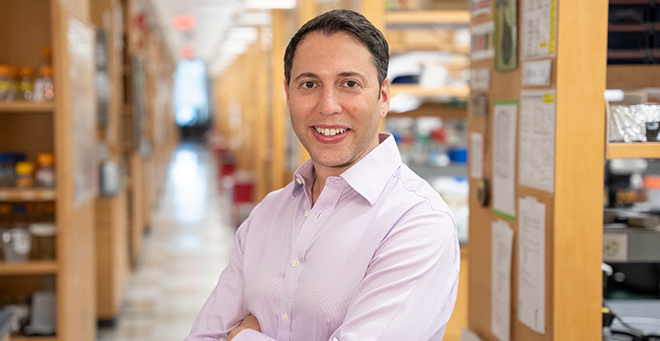
Eviatar Yemini, PhD, assistant professor of neurobiology, was chosen to receive a seed grant from the Hypothesis Fund, an innovative, new nonprofit that relies on a network of scientist “scouts” to identify and recommend novel, early-stage research to fund. Dr. Yemini will use the grant to investigate how nervous system activity is reshaped during evolution to reprogram animal behavior, focusing specifically on neural-circuit adaptations to changing climates and ecologies.
“The Hypothesis Fund provides a unique and exciting opportunity for us to focus on innovations considered too early stage for traditional funders,” Yemini said. “This grant will allow us to venture into the relatively uncharted territories of how evolution shapes behavioral circuits to adapt for changing climates and ecologies.”
The Hypothesis Fund, founded last May, supports transformative research aimed at increasing adaptability against systemic risks to the health of people and the planet. The fund provides seed grants at the earliest stages of research projects that present innovative ideas in basic research. The intention is to enable a diverse group of scientists with funding to fast-track their research.
A network of nearly 20 scientist scouts identifies and recommends seed-stage research projects to the Hypothesis Fund. Harmit Malik, PhD, an evolutionary biologist, professor and associate director at the Fred Hutchinson Cancer Center, is the scout who recommended Yemini’s work.
“Dr. Yemini’s project seeks to understand how neuronal circuits have evolved, how development shapes these circuits, and how these circuits respond to dramatically different ecology and stimuli in the context of living, developing, and adapting organisms,” Dr. Malik said. “This project is highly innovative and opens a new frontier into the field of evolutionary neurodevelopment.”
David Sanford, CEO and founder of the Hypothesis Fund, said, “Our target is new and divergent ideas that would probably be difficult to fund in traditional processes, either because of lack of preliminary data or due to the boldness of the direction or idea. It’s very fundamental science that Dr. Yemini is doing, but the implications of that work we believe could yield valuable new knowledge and increase our understanding of neural development particularly in the face of adaptive pressures, such as from climate change.”
“The whole idea is great ideas happen all the time and you shouldn’t be bound to grant application cycles to enable those ideas. We should be supporting them as they happen. That’s our goal,” said Sanford.
Yemini said the Hypothesis Fund awards provide recognition for researchers and help them stay the course in their research.
“It’s an honor and extremely energizing to have the backing and recognition of the Hypothesis Fund, the advice and support of groundbreaking scientists like Harmit and the other scouts, and access to the wonderful community of brilliant Hypothesis Fund grantees,” said Yemini.
Yemini’s grant is for 18 months. He is one of three grantees in the latest round of awards. The Hypothesis Fund is supported by charitable contributions, including from LinkedIn founder Reid Hoffman’s foundation, Gates Ventures, Lyda Hill Philanthropies and Psquared Charitable Foundation.
Related UMass Chan news stories:
Eviatar Yemini honored with 2022 Klingenstein-Simons Fellowship Award in Neuroscience
Four seed grants will be sponsored by the Dan and Dianne Riccio Fund for Neuroscience in 2022